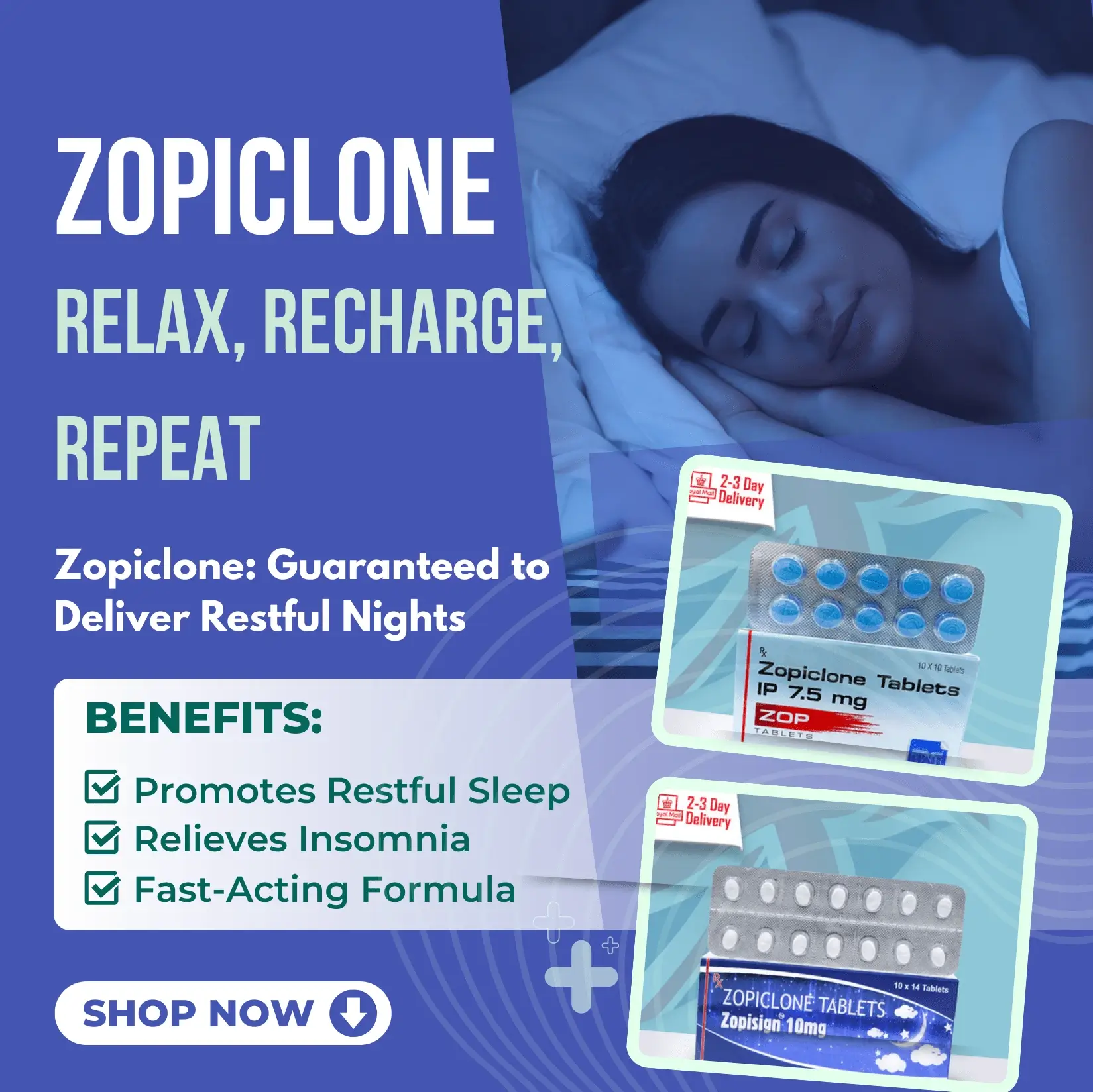Chronic Insomnia? Here's How Zopiclone Can Help (A Safe Guide)

What is Chronic Insomnia?
Chronic insomnia is a long-term sleep disorder that makes it difficult for individuals to fall asleep, stay asleep, or wake up feeling rested—despite having the opportunity to sleep. In the UK, it's estimated that around 1 in 3 people experience insomnia at some point, but when symptoms persist for three nights a week for three months or longer, it is considered chronic.
People with chronic insomnia often report:
-
Difficulty falling asleep at night
-
Waking up frequently during the night
-
Rising too early and not being able to get back to sleep
-
Feeling tired or groggy during the day
-
Difficulty concentrating or remembering things
This condition can be caused by stress, anxiety, medical conditions, medication side effects, or even poor sleep habits. Over time, untreated insomnia can seriously affect both physical and mental health—leading to low mood, irritability, weakened immunity, and poor performance at work or school.
If you're struggling with persistent sleep problems, it's important to seek guidance—either through your GP, a NHS sleep clinic, or approved treatments like Zopiclone, under medical supervision.
What is Zopiclone?
Zopiclone, marketed under the brand name Zimovane, is a type of non-benzodiazepine hypnotic. Despite not being chemically related to benzodiazepines, it acts in a similar way to help initiate and maintain sleep. Zopiclone is approved in the UK for the short-term treatment of insomnia, usually for a duration of no more than 2 to 4 weeks. This medication is prescribed when sleep problems are severe, disabling, or causing extreme distress.
How Does Zopiclone Work?
Zopiclone works by interacting with gamma-aminobutyric acid (GABA) receptors in the brain. GABA is a neurotransmitter that inhibits excessive brain activity, promoting calmness and relaxation. By enhancing the effects of GABA, zopiclone:
-
Helps individuals fall asleep faster.
-
Reduces night-time awakenings
-
Increases overall sleep duration
-
Improves sleep quality over the short term
However, prolonged use can lead to tolerance (reduced effectiveness) and dependence, which is why it’s only recommended for short-term use.
Who Should Consider Zopiclone?
Ideal Candidates:
Zopiclone is typically prescribed for short-term treatment of insomnia, especially when other methods like sleep hygiene and lifestyle changes haven’t worked. It’s most suitable for adults who:
- People with severe, short-term insomnia (e.g., due to stress or jet lag).
- Those who haven’t responded to sleep hygiene or CBT-I (Cognitive Behavioral Therapy for Insomnia).
- Patients under doctor supervision for controlled, short-term use.
Zopiclone is usually prescribed for 7 to 14 nights, just enough to reset your sleep cycle. It’s not meant for long-term use due to the potential for dependency and reduced effectiveness over time.
Who Should Avoid Zopiclone?
While Zopiclone is effective for short-term relief of insomnia, it’s not suitable for everyone. Certain individuals should avoid this medication due to potential health risks or interactions.
- People with a history of addiction (high dependency risk).
- Those with respiratory issues (can suppress breathing).
- Pregnant or breastfeeding women (not enough safety data).
- Elderly patients (higher risk of falls and confusion).
Zopiclone Dosage & How to Take It Safely
Recommended Dosage (UK Guidelines)
-
Standard dose: 3.75mg to 7.5mg taken right before bed.
-
Elderly or sensitive patients: Start with 3.75mg.
-
Maximum duration: 2-4 weeks (to avoid dependence).
Tips for Safe Use
- Take it on an empty stomach (food delays absorption).
- Avoid alcohol (increases sedation and side effects).
- Don’t drive the next morning (can cause drowsiness).
- Follow your doctor’s tapering plan if stopping.
Side Effects & Risks of Zopiclone
Common Side Effects
-
Metallic taste in mouth (reported by ~30% of users).
-
Daytime drowsiness (affects focus and coordination).
-
Dry mouth, dizziness, or headaches.
Serious Risks
-
Dependence & addiction (even after a few weeks).
-
Memory problems & confusion (especially in elderly).
-
Withdrawal symptoms (rebound insomnia, anxiety).
Safer Alternatives to Zopiclone
If you’re concerned about risks, consider:
1. NHS-Approved Non-Drug Treatments
-
Cognitive Behavioral Therapy for Insomnia (CBT-I) – Gold standard for chronic insomnia.
-
Sleep restriction therapy – Trains your brain to associate bed with sleep.
2. Alternative Medications
-
Melatonin (Circadin) – For over-55s with sleep maintenance issues.
-
Promethazine (Phenergan) – A milder, non-addictive antihistamine.
3. Natural Sleep Aids
-
Valerian root – Mild sedative effects.
-
Magnesium glycinate – Promotes muscle relaxation.
-
Lavender oil – Reduces anxiety-related insomnia.
Conclusion: Is Zopiclone Right for You?
Zopiclone can be effective for short-term insomnia, but it must be used responsibly under medical supervision.
Key Takeaways:
- Only use for 2-4 weeks (long-term use is risky).
- Get a legal prescription (avoid illegal online sellers).
- Explore alternatives (CBT-I, melatonin, lifestyle changes).
Always consult your GP before starting or stopping zopiclone.
Please log in to add a comment.
Popular Posts
Sleep Problems in Women: What UK Women Need to Know
How to handle not being able to sleep in UK
Managing Stress and Insomnia with Zopiclone Tablets: A Guide 2025
Zopiclone Withdrawal Symptoms, How to Manage Them
Chronic Insomnia? Here's How Zopiclone Can Help (A Safe Guide)
Is Zolpidem Better Than Zopiclone in the UK? A Comprehensive Comparison
Buy Zopiclone in London: NEXT-DAY Delivery for Better Sleep
Zopiclone mixed with alcohol and other drugs
Our Popular Treatments

Dr. John
Meet Dr. John Wood, a distinguished figure in the field of medicine whose career spanned over 25 years and left an indelible mark on patient care. Though he has retired from active clinical practice, his passion for healthcare remains as vibrant as ever. Dr. Wood’s extensive knowledge and experience are now channeled into our pharmacy's blog, where he shares insights that educate and empower our valued customers. His contributions not only reflect his commitment to public health but also help demystify complex medical topics for everyday readers.
.svg)
Delivered in secure, plain packaging on fully tracked delivery from just £10.

Our team of doctors and pharmacists, and our support staff, are all UK-based.
.svg)
Have a question? Telephone support is always free; Monday - Friday, 9am - 5pm.

Comments........!